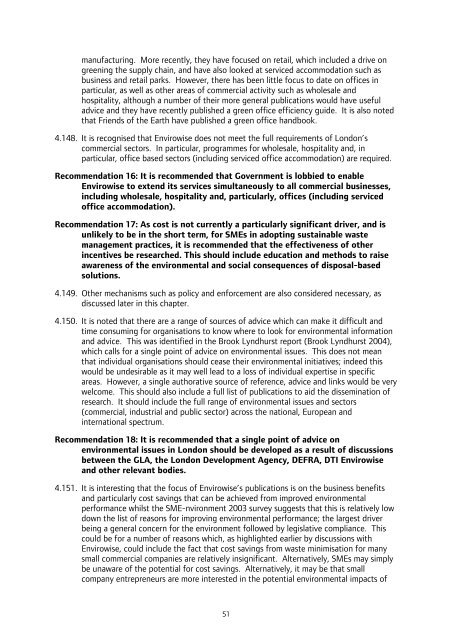London Wider Waste Strategy - London - Greater London Authority
London Wider Waste Strategy - London - Greater London Authority
London Wider Waste Strategy - London - Greater London Authority
Create successful ePaper yourself
Turn your PDF publications into a flip-book with our unique Google optimized e-Paper software.
manufacturing. More recently, they have focused on retail, which included a drive on<br />
greening the supply chain, and have also looked at serviced accommodation such as<br />
business and retail parks. However, there has been little focus to date on offices in<br />
particular, as well as other areas of commercial activity such as wholesale and<br />
hospitality, although a number of their more general publications would have useful<br />
advice and they have recently published a green office efficiency guide. It is also noted<br />
that Friends of the Earth have published a green office handbook.<br />
4.148. It is recognised that Envirowise does not meet the full requirements of <strong>London</strong>’s<br />
commercial sectors. In particular, programmes for wholesale, hospitality and, in<br />
particular, office based sectors (including serviced office accommodation) are required.<br />
Recommendation 16: It is recommended that Government is lobbied to enable<br />
Envirowise to extend its services simultaneously to all commercial businesses,<br />
including wholesale, hospitality and, particularly, offices (including serviced<br />
office accommodation).<br />
Recommendation 17: As cost is not currently a particularly significant driver, and is<br />
unlikely to be in the short term, for SMEs in adopting sustainable waste<br />
management practices, it is recommended that the effectiveness of other<br />
incentives be researched. This should include education and methods to raise<br />
awareness of the environmental and social consequences of disposal-based<br />
solutions.<br />
4.149. Other mechanisms such as policy and enforcement are also considered necessary, as<br />
discussed later in this chapter.<br />
4.150. It is noted that there are a range of sources of advice which can make it difficult and<br />
time consuming for organisations to know where to look for environmental information<br />
and advice. This was identified in the Brook Lyndhurst report (Brook Lyndhurst 2004),<br />
which calls for a single point of advice on environmental issues. This does not mean<br />
that individual organisations should cease their environmental initiatives; indeed this<br />
would be undesirable as it may well lead to a loss of individual expertise in specific<br />
areas. However, a single authorative source of reference, advice and links would be very<br />
welcome. This should also include a full list of publications to aid the dissemination of<br />
research. It should include the full range of environmental issues and sectors<br />
(commercial, industrial and public sector) across the national, European and<br />
international spectrum.<br />
Recommendation 18: It is recommended that a single point of advice on<br />
environmental issues in <strong>London</strong> should be developed as a result of discussions<br />
between the GLA, the <strong>London</strong> Development Agency, DEFRA, DTI Envirowise<br />
and other relevant bodies.<br />
4.151. It is interesting that the focus of Envirowise’s publications is on the business benefits<br />
and particularly cost savings that can be achieved from improved environmental<br />
performance whilst the SME-nvironment 2003 survey suggests that this is relatively low<br />
down the list of reasons for improving environmental performance; the largest driver<br />
being a general concern for the environment followed by legislative compliance. This<br />
could be for a number of reasons which, as highlighted earlier by discussions with<br />
Envirowise, could include the fact that cost savings from waste minimisation for many<br />
small commercial companies are relatively insignificant. Alternatively, SMEs may simply<br />
be unaware of the potential for cost savings. Alternatively, it may be that small<br />
company entrepreneurs are more interested in the potential environmental impacts of<br />
51
















